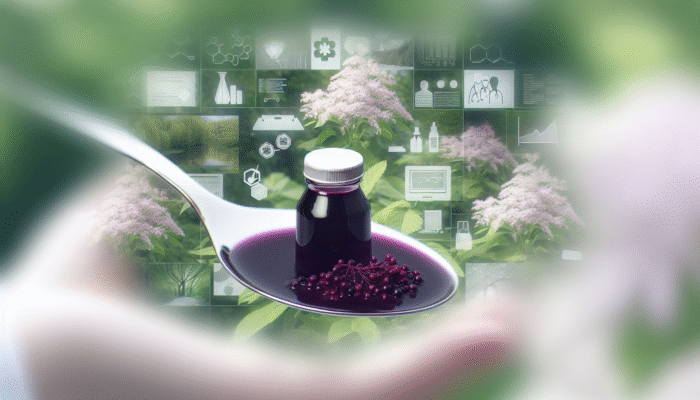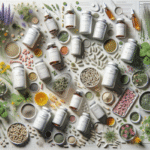Create Your Own Elderberry Syrup to Maximize Holistic Health Benefits
Comprehensive Guide for Crafting Your Own Homemade Elderberry Syrup

Creating your own elderberry syrup is not just a rewarding project; it’s an excellent way to tap into the natural healing properties found in this remarkable fruit. Start by foraging for fresh elderberries, which are plentiful in the UK from late summer through early autumn. After gathering a generous amount, rinse the berries thoroughly to eliminate any dirt or insects. In a sizable pot, combine about one cup of elderberries with four cups of water. To enhance the flavor, add half a cup of sugar and a pinch of spices like cinnamon or cloves. Bring this mixture to a boil, then lower the heat and let it simmer for approximately 30 minutes, allowing the berries to break down and release their beneficial nutrients into the syrup. Once the mixture cools, strain it through a fine sieve or cheesecloth to remove any solid particles. Finally, store your homemade syrup in a sterilised glass jar or bottle in a cool place or refrigerator, and remember to consume it within a few weeks. Taking a spoonful daily can be an effective way to help prevent cold symptoms.
Discovering the Health Benefits Associated with Elderberry Syrup
The extensive health benefits of natural herbal remedies for colds are exemplified by the powerful effects of elderberry syrup. This potent concoction is loaded with antioxidants, especially flavonoids, which are crucial in combating oxidative stress in the body. Studies show that elderberry can significantly shorten the duration of cold symptoms, making it a favored option among herbal enthusiasts and health-conscious individuals. Its high vitamin C content is vital for strengthening the immune system, enhancing the body’s natural defenses against various illnesses. Moreover, elderberry has anti-inflammatory properties that may alleviate swelling within the respiratory tract, making breathing easier during a cold. This gentle yet effective remedy is suitable for all ages; however, it is wise to consult with a healthcare professional regarding specific health concerns or conditions before starting any new treatment.
Your Foraging Journey: Finding Elderberries in the UK
Embarking on a quest to locate elderberries in the UK can be an exciting and fulfilling experience, particularly for those who enjoy foraging. Look for elder trees in hedgerows and woodlands, especially in picturesque areas like the Yorkshire countryside or the expansive forests of Scotland. If foraging is not your preference, elderberries are widely available at local markets during their harvest season. Additionally, health food stores often stock various elderberry products, including syrups and capsules, making them accessible throughout the year. This easy availability allows you to incorporate this natural remedy for colds into your wellness routine effortlessly, providing a convenient option for maintaining your health effectively.
Determining the Ideal Dosage for Elderberry Syrup

The typical dosage of elderberry syrup for adults is generally one tablespoon per day, while children are recommended to take a smaller dosage of one teaspoon. However, it is essential to consult with a healthcare provider to tailor the dosage to individual needs, particularly for those with pre-existing health conditions or pregnant women. Given the effectiveness of elderberry as a remedy, personalising the dosage ensures that you obtain maximum benefits while minimizing the risk of any potential adverse effects.
Understanding Potential Side Effects of Elderberry Syrup
While elderberry syrup is widely regarded as safe, some individuals may experience mild side effects, such as digestive discomfort or allergic reactions. It is crucial to monitor your body’s response, especially if you are new to herbal remedies. Furthermore, elderberry may interact with certain medications, particularly those that influence the immune system. Therefore, consulting with a healthcare professional prior to starting elderberry syrup is recommended to avoid potential complications and to ensure safe consumption.
How to Brew a Refreshing and Soothing Cup of Peppermint Tea
Simple Steps to Brew Invigorating Peppermint Tea

Brewing a comforting cup of peppermint tea is a delightful way to enjoy the numerous benefits that this aromatic herb provides. Start with either fresh or dried peppermint leaves, which can be easily found in UK supermarkets, or consider growing your own if you have the space. For tea preparation, take a handful of fresh leaves or 1 to 2 teaspoons of dried peppermint, and steep them in hot water—ideally just below boiling point—for about 5 to 10 minutes. The longer you steep the leaves, the more intense the flavor will become. For added sweetness or acidity, consider drizzling in some honey or adding a slice of lemon. This fragrant infusion not only serves as a soothing remedy but can also be enjoyed any time of day, especially during the cold and flu season when its calming properties are most beneficial.
Uncovering the Soothing and Therapeutic Benefits of Peppermint Tea
Peppermint tea is more than just a pleasant beverage; it acts as a powerful ally against various cold symptoms. The menthol found in peppermint serves as a natural decongestant, effectively clearing nasal passages and alleviating sinus pressure. This makes it particularly beneficial for individuals experiencing congestion or a blocked nose. Furthermore, peppermint’s soothing properties can help ease sore throats, providing a gentle cooling sensation that relieves discomfort. Regularly enjoying peppermint tea can also promote relaxation, making it an ideal choice before bedtime, especially when feeling unwell.
Where to Source Fresh Peppermint in the UK
One of the most appealing aspects of peppermint is its widespread availability. In the UK, peppermint plants flourish in many gardens and are incredibly easy to grow, thriving in pots or garden beds. If you prefer purchasing peppermint, local nurseries typically offer young peppermint plants. Supermarkets usually carry both fresh mint leaves and dried tea bags, ensuring convenience for anyone eager to integrate herbal remedies into their daily routines. By sourcing peppermint locally, you not only enjoy vibrant flavors but also support local growers, positively impacting your community.
Steps to Create Your Own Echinacea Tincture for Immune Support
Detailed Instructions for Crafting Echinacea Tincture
Making your own echinacea tincture is a fulfilling venture that allows you to harness the powerful health benefits associated with this renowned herb. Start by obtaining dried echinacea roots, which can be conveniently found at health food shops or online retailers. To prepare the tincture, immerse the roots in high-proof alcohol, such as vodka, for several weeks, ensuring to shake the mixture daily to promote effective infusion. After a duration of two to six weeks, strain the liquid through a fine sieve or cheesecloth to remove any plant materials. The resulting tincture can be diluted in water or taken directly, with a few drops generally recommended for daily use. This concentrated form of echinacea serves as an effective means to bolster and support your immune system.
Enhancing Immune Function: The Advantages of Echinacea
Echinacea is celebrated for its ability to stimulate the immune system, making it one of the most sought-after natural remedies for colds. Research indicates that echinacea can significantly reduce the severity and duration of cold symptoms by enhancing the activity of white blood cells, which play a crucial role in combating infections. Regular use of echinacea tincture may improve your body’s ability to fend off colds, particularly during peak seasons when viral infections are more common. This remedy is especially beneficial for individuals with weakened immune systems or those frequently exposed to illnesses, providing an additional layer of protection during challenging times.
Finding High-Quality Echinacea Products in the UK
Locating premium echinacea products in the UK is relatively straightforward. Health food stores across the country typically offer a diverse selection of echinacea varieties, including tinctures, capsules, and dried roots. Well-known retailers like Holland & Barrett often provide a range of echinacea products, making them easily accessible for those seeking natural remedies. Moreover, many local herbalists offer fresh echinacea plants, ideal for those who wish to cultivate their remedies at home, fostering a deeper connection to the healing benefits of this exceptional herb.
Guidelines for Echinacea Tincture Dosage
The recommended dosage for echinacea tincture typically starts at 1-2 ml taken three times daily. However, individual reactions to echinacea can vary, making it crucial to adjust the dosage based on personal experience and specific needs. Always consult a healthcare provider for tailored guidance, especially if you are pregnant, nursing, or taking medications, to ensure you optimize the benefits without encountering any unwanted side effects.
Identifying Possible Side Effects of Echinacea
Although echinacea is generally well-tolerated, some individuals may experience side effects such as allergic reactions, gastrointestinal discomfort, or dizziness. If you notice any adverse reactions, it is essential to discontinue use and seek medical advice promptly. Additionally, echinacea may interact with certain medications, particularly those that suppress the immune system, so consulting a healthcare professional before use is vital to ensure a safe and effective experience.
Harnessing Thyme for Its Health Benefits
Creating a Simple Thyme Infusion for Maximum Benefits
Preparing a thyme infusion is an uncomplicated yet remarkably effective way to utilize this robust herb, especially during the cold season. Start by boiling water in a kettle, then add several sprigs of fresh thyme or 1 to 2 teaspoons of dried thyme leaves to a heatproof container. Pour the boiling water over the thyme and let it steep for about 10 minutes. The longer you allow it to steep, the more potent the infusion will become. After steeping, strain the mixture to remove the thyme leaves and savor it warm. To enhance flavor and health benefits, consider adding a drizzle of honey or a squeeze of lemon, amplifying its therapeutic effects and overall enjoyment.
Exploring Thyme’s Respiratory Benefits and Natural Healing Properties
Thyme is highly valued for its antiseptic properties, making it an excellent choice for alleviating respiratory issues associated with colds and flu. The active compounds found in thyme, such as thymol, boast proven antibacterial and antiviral capabilities, helping relieve coughs and soothe sore throats. When enjoying thyme infusion, the steam can also assist in clearing nasal passages, allowing for easier breathing. This makes thyme a formidable ally for individuals suffering from congestion or bronchial irritation related to colds, providing a natural and effective remedy.
Where to Locate Thyme in the UK for Optimal Use
In the UK, thyme is widely accessible and can typically be found in most supermarkets, making it easy for anyone to incorporate this beneficial herb into their health regimen. Additionally, thyme is a popular herb to grow in home gardens; it thrives in pots and requires minimal maintenance, making it an ideal choice for novice gardeners. By cultivating your thyme, you ensure a steady supply of this potent herb, enabling you to create infusions at home whenever necessary, thereby deepening your connection to nature.
The Health Benefits of Garlic and Honey for Effective Cold Relief
Steps for Creating the Potent Garlic and Honey Mixture
Combining garlic and honey creates a powerful mixture that harnesses the extensive health benefits of both ingredients. Start by crushing several garlic cloves; this action activates allicin, the compound responsible for garlic’s impressive medicinal properties. Once crushed, blend the garlic with raw honey in a jar and allow it to sit for a few days, enabling the flavors and health benefits to meld together. This sweet elixir can be taken by the spoonful daily, providing natural relief from cold symptoms. The preparation is straightforward and can be easily made at home, ensuring you have a potent natural remedy available whenever needed.
Examining the Antimicrobial Effects of Garlic and Honey
The combination of garlic and honey forms a formidable duo in the realm of natural remedies for colds. Garlic is well-known for its antimicrobial properties, which can help combat infections, while honey serves as a soothing agent, particularly effective for sore throats. Together, they create a synergistic effect that not only alleviates symptoms but also addresses the underlying causes of colds. Research indicates that garlic can enhance immune function, making this combination particularly potent during the cold season. Additionally, the natural sweetness of honey enhances its flavor, transforming it into a delicious and beneficial addition to your daily wellness routine.
Accessing Garlic and Honey in the UK for Your Remedies
Both garlic and honey are staple ingredients commonly found in many UK kitchens, making this remedy incredibly accessible. Garlic is widely available in supermarkets and local markets year-round, while honey, particularly raw or local varieties, can be sourced from health food shops or farmers’ markets. This means that anyone can easily prepare this herbal concoction without needing specialized ingredients, making it a fantastic option for those seeking natural alternatives to over-the-counter cold medications. The simplicity and efficacy of this remedy make it a popular choice for numerous households across the nation.
Brewing a Refreshing and Invigorating Lemon and Ginger Tea
Step-by-Step Process for Brewing Delicious Lemon and Ginger Tea
Preparing a cup of lemon and ginger tea is an enjoyable ritual that not only offers comfort but also a multitude of health benefits. Start by slicing fresh ginger root and a lemon, then place them into a saucepan filled with water. Bring the mixture to a boil, allowing the flavors to meld for about 10 minutes. After boiling, remove from heat and let it steep for a few additional minutes to enhance the infusion. You might sweeten your tea with honey for extra flavor and health benefits. This zesty infusion is not only refreshing but also serves as a powerful remedy for cold symptoms, making it a preferred choice during the colder months when colds are prevalent.
Examining the Cold-Fighting Properties of Lemon and Ginger
Lemon and ginger are both celebrated for their powerful abilities to combat colds. Ginger contains anti-inflammatory compounds that can assist in relieving congestion and soothing a sore throat, while lemon is abundant in vitamin C, which is essential for bolstering the immune system. Regularly enjoying this tea during the cold season can significantly enhance your body’s capacity to fend off illnesses. Furthermore, the warmth of the tea can help alleviate body aches and provide comfort during recovery, making it an invaluable addition to your herbal arsenal for tackling cold symptoms.
Where to Source Ginger and Lemons in the UK for Your Tea
Ginger and lemons are widely available in UK supermarkets, ensuring you can easily obtain these essential ingredients whenever needed. Fresh ginger is usually found in the produce section, while lemons are available throughout the year. Local markets may also offer seasonal varieties, providing you with a range of options. This accessibility simplifies the process of incorporating lemon and ginger tea into your daily routine, particularly during the cold and flu season when it is most beneficial.
Additional Health Advantages of Lemon and Ginger Tea Beyond Cold Relief
Beyond their immediate cold-fighting benefits, lemon and ginger tea offers a variety of supplementary health advantages. This combination aids digestion, boosts immunity, and can even alleviate nausea. Regularly enjoying this infusion not only enhances your overall well-being but also provides a comforting drink for chilly evenings. Its warming properties create a sense of comfort, making it a go-to remedy for many households in the UK, especially as colder weather approaches and flu season begins.
Utilizing Sage Gargle for Effective Sore Throat Relief
Simple and Effective Method for Gargling with Sage
A sage gargle is a straightforward yet effective technique to alleviate a sore throat, utilizing the antibacterial properties inherent in sage. To prepare, boil fresh sage leaves in water, allowing them to infuse for about 10 minutes. Once the mixture has cooled to a comfortable temperature, use it as a gargle to rinse your throat. This herbal remedy is not only easy to create but also provides immediate relief from discomfort associated with colds or respiratory infections. Regularly using a sage gargle can help soothe throat irritation, making it a valuable addition to your herbal toolkit for addressing cold symptoms.
Common Questions About Herbal Remedies for Cold Relief
What Are the Most Effective Natural Remedies for Cold Symptoms?
The most effective natural remedies for colds include elderberry syrup, peppermint tea, echinacea tincture, thyme infusion, garlic and honey, lemon and ginger tea, and a sage gargle. Each of these remedies offers unique benefits to naturally alleviate cold symptoms, providing a holistic approach to wellness.
How Does Elderberry Syrup Assist in Cold Recovery?
Elderberry syrup is rich in antioxidants and vitamin C, which can significantly enhance the immune system and reduce the duration of cold symptoms, making it a popular choice during the cold season for those seeking natural relief.
Can I Grow My Own Peppermint at Home with Ease?
Yes, peppermint is remarkably easy to cultivate in pots or gardens and thrives well in most UK climates. It’s a wonderful addition to any herb garden, providing fresh leaves for tea and various culinary applications.
What Is the Optimal Way to Take Echinacea for Maximum Immune Benefits?
Echinacea can be consumed in tincture, tea, or capsule form. The tincture is generally taken in doses of 1-2 ml three times daily to provide optimal support for the immune system and benefits during the cold season.
Are There Any Side Effects Associated with Garlic and Honey Mixture?
While generally safe, garlic can cause digestive upset in some individuals. Additionally, honey should not be given to infants under one year of age due to the risk of botulism, which can be harmful to young children.
How Often Can I Drink Lemon and Ginger Tea for Best Immune Support?
You can enjoy lemon and ginger tea daily, particularly during the cold season when its anti-inflammatory properties make it a beneficial component of your wellness routine and assist in effectively combating cold symptoms.
What Symptoms Can Thyme Infusion Help Alleviate Effectively?
Thyme infusion can effectively relieve coughs, sore throats, and congestion due to its antiseptic and soothing properties, making it an excellent herbal remedy for colds and respiratory discomfort.
How Long Does It Take to Prepare Echinacea Tincture for Maximum Efficacy?
Preparing echinacea tincture typically requires about 2 to 6 weeks for proper infusion, so it is wise to plan ahead if you want to have this remedy ready for when colds strike and your body needs support.
Is It Safe to Gargle with Sage for Throat Relief?
Yes, gargling with sage is both safe and effective for soothing sore throats due to its antibacterial properties; however, ensure the mixture has cooled sufficiently to avoid burns and provide a comfortable experience.
Where Can I Find These Herbs and Remedies in the UK for Easy Access?
Many herbs such as elderberry, peppermint, echinacea, thyme, garlic, and ginger are widely available in UK supermarkets, local markets, and health food shops. Additionally, these herbs can be easily cultivated at home, providing a sustainable option for anyone interested in natural remedies.
Connect with us on Facebook for More Wellness Tips and Updates!
The Article: Simple Herbal Remedies for Colds: Traditional UK Cures appeared first on https://mcrtherapies.co.uk
The Article Herbal Remedies for Colds: Traditional Cures from the UK Was Found On https://limitsofstrategy.com
The Article Herbal Remedies for Colds: Traditional UK Cures First Appeared ON
: https://ad4sc.com

